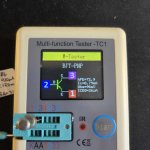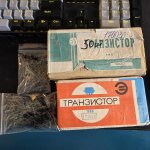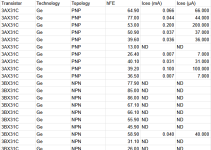Stickman393
Well-known member
Addendum: I also picked up some of the so-called "AC128s" from China.
These are interesting. Not so much in their usability: that seems unlikely. Best I've found out of the bunch this far has been a leakage of 570uA.
But, they're *really* shiny. Like, gleaming. Almost makes me wonder if somebody is trying to do new production.
If they are, they're either failing miserably, or shipping all the qc rejects to the states.
These are interesting. Not so much in their usability: that seems unlikely. Best I've found out of the bunch this far has been a leakage of 570uA.
But, they're *really* shiny. Like, gleaming. Almost makes me wonder if somebody is trying to do new production.
If they are, they're either failing miserably, or shipping all the qc rejects to the states.




